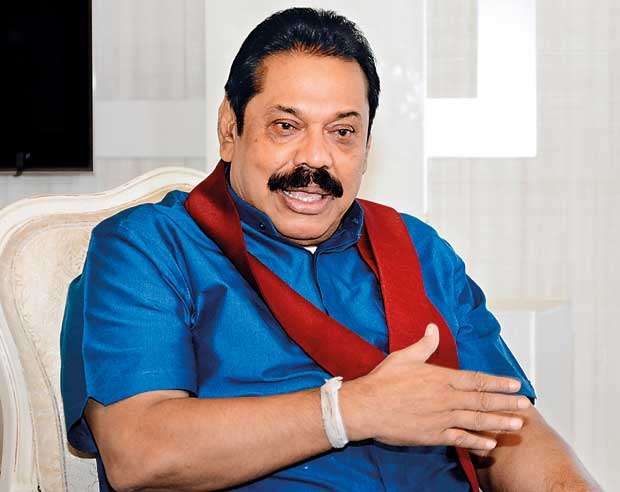19 Nov 2018 - {{hitsCtrl.values.hits}}

 he farcical three-week Government and the circus of thuggery in Parliament has thrown the country into a serious political crisis. While media attention and public discussion are focused on questions of parliamentary democracy and constitutional legitimacy, the roots of the crisis lie in decades of neo-liberal economic policies that have created instability and dispossession.
he farcical three-week Government and the circus of thuggery in Parliament has thrown the country into a serious political crisis. While media attention and public discussion are focused on questions of parliamentary democracy and constitutional legitimacy, the roots of the crisis lie in decades of neo-liberal economic policies that have created instability and dispossession.
In recent weeks, pro-Rajapaksa ideologues have put forward a distorted understanding of neoliberalism to bolster their nationalist campaign. Economic devastation, they argue, necessitated the appointment of Mahinda Rajapaksa (MR) as Prime Minister to reverse the three year-long neoliberal onslaught, which they claim has undermined Sri Lanka’s sovereignty. According to them, it is only by arresting the sale of Sri Lanka’s assets and guarding the country’s sovereignty that the economic crisis can be addressed. Leaving aside complicity in MR’s anti-democratic politics, this article questions their flawed understanding of neo-liberalism. Their discourse of sovereignty is dangerous because it stokes xenophobic nationalism, and does not address the tremendous dispossession of ordinary people under neo-liberal capitalism.
It is true that Ranil Wickremesinghe’s UNP has been aggressive in promoting an international financial centre and free trade pacts. However, let’s be clear that financialisation, trade liberalization and massive internationally-financed infrastructure/urban development projects were also the central plank of MR’s economic programme. Yet, the latter’s economic policies together with the initiation of the Port City, Shangri- La, Hambantota Port and others projects are ignored, while the leasing of the Hambantota port and Colombo Port East Terminal as well as the Singapore FTA are called ‘neo-liberalism’ by the Rajapaksa ideologues.
financialisation, trade liberalization and massive internationally-financed infrastructure/urban development projects were also the central plank of MR’s economic programme. Yet, the latter’s economic policies together with the initiation of the Port City, Shangri- La, Hambantota Port and others projects are ignored, while the leasing of the Hambantota port and Colombo Port East Terminal as well as the Singapore FTA are called ‘neo-liberalism’ by the Rajapaksa ideologues.
More importantly, such a narrow characterization of neo-liberalism is inadequate because it does not address the economic processes and dynamics that affect people’s lives. Their version of neo-liberalism, which focuses on whether state assets and national projects are controlled by or awarded to foreign entities, is more akin to a politics of economic nationalism. In other words, they are concerned about whether foreign or national capital gains in the process, but lack a critique of capital itself and the consequent forms of exploitation and dispossession.
 Neo-liberalism, as articulated by Marxist geographer David Harvey and others, is a class project of finance capital. In addition to exploitation of labour in the process of capitalist production, in the neo-liberal age, finance capital directly dispossess people of their wealth, assets and entitlements; when necessary force is also used for example to grab lands and resources from people. Furthermore, under neo-liberal globalization, the distinction between global and national finance capital no longer holds as the financial and banking sectors in each country are integrated into the global financial system. It is finance capital – both global finance and its local financial partners – that gain, while it is the working people that lose out.
Neo-liberalism, as articulated by Marxist geographer David Harvey and others, is a class project of finance capital. In addition to exploitation of labour in the process of capitalist production, in the neo-liberal age, finance capital directly dispossess people of their wealth, assets and entitlements; when necessary force is also used for example to grab lands and resources from people. Furthermore, under neo-liberal globalization, the distinction between global and national finance capital no longer holds as the financial and banking sectors in each country are integrated into the global financial system. It is finance capital – both global finance and its local financial partners – that gain, while it is the working people that lose out.
Since the open economy policies of 1978, the financial sector in Sri Lanka has been expanding with occasional crises exacerbated by the collapse of finance companies and even some banks. The growth of the financial sector has accelerated considerably over the last decade, particularly after the war ended and the inflow of global capital. While many of the finance companies in Sri Lanka were started by and, for the most part, are owned by local financiers, the major banks are owned by the state. These finance companies and banks have been integrated into the global financial system with the inflow of investments and loans from global financiers. It is such finance capital that is behind the major expansion of leasing, micro-finance and pawning businesses, which have to a great extent been responsible for the dispossession of working people through rising indebtedness.
We seem to have a very short memory. The MR regime was in the forefront of providing avenues for the accumulation of finance capital. The promotion of capital markets, including efforts to divert EPF funds to inflate the Colombo Stock Exchange, the expansion of the insurance industry, and the pressures for state banks to take large international loans after the war, all contributing towards greater financialisation of the national economy and its integration with global finance capital.
Much of the global capital inflows were invested in real estate, including condominiums, supported by policies promoting the urbanization and beautification of Colombo.
"Nationalism, whether it is Sinhala Buddhist nationalism or Tamil nationalism, are potent for electoral campaigns. They have, time and again, proven effective in dividing ethnic communities to mobilize electoral support, but in the process also unleash fear and even violence against dissent."
The growth of the stock market and expansion of the real estate sector are dependent on speculation, and deliver whopping profits for finance capital, but dispossess working people as repeated speculative booms followed by bursts become justification to cut social welfare and privatize public services.
Neo-liberal accumulation targets people’s entitlements such as free education and healthcare. Privatization and commercialization of education, and the promotion of private healthcare and health insurance industries, have become avenues for new profit-seeking businesses.
In this context, inequality has been rising in the country over the last decade in particular, both in terms of disparity in income and wealth as well as access to decent social welfare. On the other hand, a small wealthy class has emerged displaying their massive mansions and luxury vehicles through accumulation in the finance and construction industries.
In reality, the substance of the neo-liberal economic policies of the Sirisena-Wickremesinghe Government after 2015 were no different from the economic policies of the MR Government after the war. That is why the pro-Rajapksa ideologues’ critique of the neo-liberal trajectory of the economy is so weak. They are compelled to latch on to nationalist arguments about the undermining of sovereignty. Ironically, such ideologues do not consider the fact that it was the MR regime that initiated the sale of sovereign bonds a decade ago. With billions of US dollars in sovereign bonds that have to be repaid over the next few years, those loans now provide leverage for the IMF and rating agencies backed by global finance capital to push for further neo-liberal reforms.
The nationalist arguments about sovereignty focus on the bilateral agreements in trade and investment, and how Sri Lanka’s assets and wealth are being sold.
However, they have no answer to the exploitation and dispossession that comes through the projects taken forward by local financiers and for that matter the collusion of local and foreign capital. Furthermore, the economic rhetoric of the three-week MR Government almost immediately retreated to statements about the importance of wooing foreign investors; comments that are conveniently ignored by the MR ideologues.
These contradictions aside, the thrust of the pro-MR critique is in reality neither about neo-liberalism nor about the sovereignty of the people, as any genuine critique of both would have focused on the exploitation and dispossession of people. Rather, it is about their conception of the nation and national sovereignty, both important to shore up nationalist support to a Rajapaksa government.
"Neo-liberal accumulation targets people’s entitlements such as free education and healthcare. Privatization and commercialization of education, and the promotion of private healthcare and health insurance industries, have become avenues for new profit-seeking businesses. "
The nationalist campaign to consolidate power is framed around xenophobic fears of external intervention with MR portrayed as the strong leader to the nationalist task of withstanding external pressures. Some of those leftists opposed to imperialist intervention also fall for this rhetoric, because they forget that their opposition to external forces should be based on principles of democracy, equality and economic justice. Sadly, they fall victim to an authoritarian nationalist who carries forward the same attacks against democracy and people’s economic lives in the name of national sovereignty.
Nationalism, whether it is Sinhala Buddhist nationalism or Tamil nationalism, are potent for electoral campaigns.
They have, time and again, proven effective in dividing ethnic communities to mobilize electoral support, but in the process also unleashed fear and even violence against dissent. Xenophobia stoked by such nationalist campaigns often lead to witch hunts for “enemies within,” including attacks on one or another minority community in the country, as with the attacks on the Muslim community over the last five years.
In the absence of any serious economic alternative, Rajapaksanomics, if given the opportunity to take hold, will be more of the neo-liberal policies we have seen over the last decade blared with nationalist peddling of sovereignty in tandem with fears of separatism.
Polarization of communities and the consolidation of authoritarian power will in reality set conditions to entrench a neo-liberal economy, including with the force necessary to crush resistance and continue the exploitation and dispossession of people.
30 Nov 2024 2 hours ago
30 Nov 2024 3 hours ago
30 Nov 2024 4 hours ago
30 Nov 2024 6 hours ago
30 Nov 2024 9 hours ago